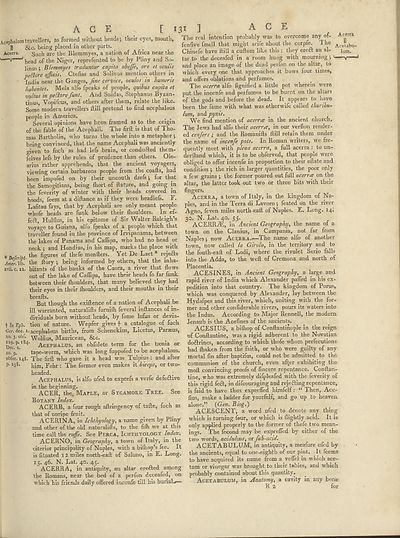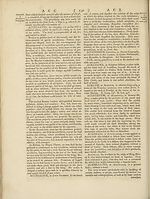Encyclopaedia Britannica, or, a Dictionary of arts, sciences, and miscellaneous literature : enlarged and improved. Illustrated with nearly six hundred engravings > Volume 1, A-AME
(149) Page 131 - ACE
Download files
Complete book:
Individual page:
Thumbnail gallery: Grid view | List view

ACE . f i
Acephalous travellers, as formed without heads; their eyes, mouth,
|| &c. being placed in other parts.
Acerra. 5uch are the Blemmyes, a nation of Africa near the
head of the Niger, reprefented to be by Pliny and So-
linus; Blemmyes traduntur capita abejfe, ore et oculis
peBore qffixis. Ctefias and Solinus mention others in
India near the Ganges, fine cervice, oculos in humeris
habentes. Mela alf© fpeaks of people, quibus capita et
vultus in peSiore funt. And Suidas, Stephanus Byzan-
tinus, Vopifcus, and others after them, relate the like.
Some modern travellers ftill pretend to find acephalous
people in America.
Several opinions have been framed as to the origin
of the fable of the Acephali. The firft is that of Tho¬
mas Bartholin, who turns the whole into a metaphor;
being convinced, that the name Acephali was anciently
given to fuch as had lefs brain, or conduced them-
felves lefs by the rules of prudence than others. Ole-
arius rather apprehends, that the ancient voyagers,
viewing certain barbarous people from the coafts, had
been impofed on by their uncouth drefs; for that
the Samogitians, being ftiort of ftature, and going in
the feverity of winter with their heads covered in
hoods, feem at a diftance as if they were headlefs. F.
Lafitau fays, that by Acephali are only meant people
whofe heads are funk below their (boulders. In ef-
fe&, Hulfius, in his epitome of Sir Walter Raleigh’s
voyage to Guiana, alfo fpeaks of a people which that
traveller found in the province of Irvipanama, between
the lakes of Panama and Caffipa, who had no head or
neck ; and Hondius, in his map, marks the place with
the %ures of thefe roonfters* Yet De Laet * rejefts
Amei\]L ‘. the (lory ; being informed by others, that the inha-
xvii.c. zz. bitants of the banks of the Caora, a river that flows
out of the lake of Caflipa, have their heads fo far funk
between their fhoulders, that many believed they had
their eyes in their (boulders, and their mouths in their
breads.
But though the exiftence of a nation of Acephali be
ill warranted, naturalifts furnifli feveral inftances of in¬
dividuals born without heads, by fome lufus or devia-
I In Eph. tion of nature. Wepfer gives f a catalogue of fuch
Ger. dec. i. acephalous births, from Schenckius, Licetus, Paraeus,
an. 3. obu \y0]fiUSi Mauriceau, &c.
l)ec *2 18^" Acephalus, an obfolete term for the taenia or
an. 9. tape-worm, which was long fuppofed to be acephalous,
obfer. 148. The firft who gave it a head was Tulprius : and after
P12S8* him, Fehr : The former even makes it biceps, or two-
headed.
Acephalus, is alfo ufed to exprefs a verfe defe£live
in the beginning.
ACER, the. Maple, or Sycamore Tree. See
Botany Index.
ACERB, a four rough aftringency of tafte, fuch as
that of unripe fruit.
ACERINA, in Ichthyology, a name given by Pliny
and other of the old naturalifts, to the fi(h we at this
time call the ruffe. See Perca, Ichthyology Index.
ACERNO, in Geography, a town of Italy, in the
citerior principality of Naples, with a bilhop’s fee. It
is fituated 12 miles north-eaft of Saluno, in E. Long.
15. 46. N. Lat. 40. 45.
ACERRA, in antiquity, an altar erefted among
the Romans, near the bed of a perfon deceafed, on
which his friends daily offered incenfe till his burial*—
!i ] ACE
The real intention probably was to overcome any of- Acevra.
fenfive fmell that might arife about the corpfe. The Ace,tiabu.
Chinefe have ftill a cuftom like this : they eredl an al- lum.
tar to the deceafed in a room hung with mourning ; —y—“
and place an image of the dead perfon on the altar, to
which every one that approaches it bows four times,
and offers oblations and perfumes.
The acerra alfo fignified a little pot wherein were
put the incenfe and perfumes to be burnt on the altars
of the gods and before the dead. It appears to have
been the fame with what was otherwife called thunbu-
lum, and pyxis.
We find mention of acerrce in the ancient church.
The Jews had alfo their acerrce, in our verfion render¬
ed cenfers ; and the Romanifts ftill retain them under
the name of incenfe pots. In Roman writers, we fre¬
quently meet with plena acerra, a full acerra : to un-
derftand which, it is to be obferved, that people were
obliged to offer incenfe in proportion to their eftate and
condition ; the rich in larger quantities, the poor only
a few grains ; the former poured out full acerrce on the
altar, the latter took out two or three bits with their
fingers,
Acerra, a town of Italy, in the kingdom of Na¬
ples, and in the Terra di Lavoro ; feated on the river
Agno, feven miles north-eaft of Naples. E. Long. 14;
30. N. Lat. 40. 55.
ACERRAt, in Ancient Geography, the name of a
town on the Clanius, in Campania, not far from
Naples; now Acerra.—The name alfo of another
town, now called la Girola, in the territory and to
the fouth-eaft of Lodi, where the rivulet Serio falls
into the Adda, to the Aveft of Cremona and north of
Placentia.
ACESINES, in Ancient Geography, a large and
rapid river of India which Alexander paffed in his ex¬
pedition into that country. The kingdom of Porus,
which was conquered by Alexander, lay between the
Hydafpes and this river, which, uniting with the for¬
mer and other confiderable rivers, pours its waters into
the Indus. According to Major Rennell, the modern
Jenaub is the Acefines of the ancients.
ACESIUS, a bifliop of Conftantinople in the reign
of Conftantine, was a rigid adherent to the Novatian
doftrines, according to which thofe whom perfecutions
had (haken from the faith, or who were guilty of any
mortal fin after baptifm, could not be admitted to the
communion of the church, even after exhibiting the
mod convincing proofs of fincere repentance. Conftan¬
tine, who was extremely difpleafed with the feverity of
this rigid fe&, in difeouraging and reje&ing repentance,
is faid to have thus expreffed himfelf: “ Then, Ace-
fius, make a ladder for yourfelf, and go up to heaven
alone.” {Gen. Blog.)
ACESCENT, a word ufed to denote any thing
which is turning (®ur, or which is (lightly acid. It is
only applied properly to the former of thefe two mean¬
ings. The fecond may be expreffed by either of the
two words, acidulous, or fub-acid.
ACETABULUM, in antiquity, a meafure ufed by
the ancients, equal to one-eighth of our pint. It feems
to have acquired its name from a veffel in which ace-
tum or vinegar was brought to their tables, and which
probably contained about this quantity.
Acetabulum, in Anatomy, a cavity in any bone
R 2 for
Acephalous travellers, as formed without heads; their eyes, mouth,
|| &c. being placed in other parts.
Acerra. 5uch are the Blemmyes, a nation of Africa near the
head of the Niger, reprefented to be by Pliny and So-
linus; Blemmyes traduntur capita abejfe, ore et oculis
peBore qffixis. Ctefias and Solinus mention others in
India near the Ganges, fine cervice, oculos in humeris
habentes. Mela alf© fpeaks of people, quibus capita et
vultus in peSiore funt. And Suidas, Stephanus Byzan-
tinus, Vopifcus, and others after them, relate the like.
Some modern travellers ftill pretend to find acephalous
people in America.
Several opinions have been framed as to the origin
of the fable of the Acephali. The firft is that of Tho¬
mas Bartholin, who turns the whole into a metaphor;
being convinced, that the name Acephali was anciently
given to fuch as had lefs brain, or conduced them-
felves lefs by the rules of prudence than others. Ole-
arius rather apprehends, that the ancient voyagers,
viewing certain barbarous people from the coafts, had
been impofed on by their uncouth drefs; for that
the Samogitians, being ftiort of ftature, and going in
the feverity of winter with their heads covered in
hoods, feem at a diftance as if they were headlefs. F.
Lafitau fays, that by Acephali are only meant people
whofe heads are funk below their (boulders. In ef-
fe&, Hulfius, in his epitome of Sir Walter Raleigh’s
voyage to Guiana, alfo fpeaks of a people which that
traveller found in the province of Irvipanama, between
the lakes of Panama and Caffipa, who had no head or
neck ; and Hondius, in his map, marks the place with
the %ures of thefe roonfters* Yet De Laet * rejefts
Amei\]L ‘. the (lory ; being informed by others, that the inha-
xvii.c. zz. bitants of the banks of the Caora, a river that flows
out of the lake of Caflipa, have their heads fo far funk
between their fhoulders, that many believed they had
their eyes in their (boulders, and their mouths in their
breads.
But though the exiftence of a nation of Acephali be
ill warranted, naturalifts furnifli feveral inftances of in¬
dividuals born without heads, by fome lufus or devia-
I In Eph. tion of nature. Wepfer gives f a catalogue of fuch
Ger. dec. i. acephalous births, from Schenckius, Licetus, Paraeus,
an. 3. obu \y0]fiUSi Mauriceau, &c.
l)ec *2 18^" Acephalus, an obfolete term for the taenia or
an. 9. tape-worm, which was long fuppofed to be acephalous,
obfer. 148. The firft who gave it a head was Tulprius : and after
P12S8* him, Fehr : The former even makes it biceps, or two-
headed.
Acephalus, is alfo ufed to exprefs a verfe defe£live
in the beginning.
ACER, the. Maple, or Sycamore Tree. See
Botany Index.
ACERB, a four rough aftringency of tafte, fuch as
that of unripe fruit.
ACERINA, in Ichthyology, a name given by Pliny
and other of the old naturalifts, to the fi(h we at this
time call the ruffe. See Perca, Ichthyology Index.
ACERNO, in Geography, a town of Italy, in the
citerior principality of Naples, with a bilhop’s fee. It
is fituated 12 miles north-eaft of Saluno, in E. Long.
15. 46. N. Lat. 40. 45.
ACERRA, in antiquity, an altar erefted among
the Romans, near the bed of a perfon deceafed, on
which his friends daily offered incenfe till his burial*—
!i ] ACE
The real intention probably was to overcome any of- Acevra.
fenfive fmell that might arife about the corpfe. The Ace,tiabu.
Chinefe have ftill a cuftom like this : they eredl an al- lum.
tar to the deceafed in a room hung with mourning ; —y—“
and place an image of the dead perfon on the altar, to
which every one that approaches it bows four times,
and offers oblations and perfumes.
The acerra alfo fignified a little pot wherein were
put the incenfe and perfumes to be burnt on the altars
of the gods and before the dead. It appears to have
been the fame with what was otherwife called thunbu-
lum, and pyxis.
We find mention of acerrce in the ancient church.
The Jews had alfo their acerrce, in our verfion render¬
ed cenfers ; and the Romanifts ftill retain them under
the name of incenfe pots. In Roman writers, we fre¬
quently meet with plena acerra, a full acerra : to un-
derftand which, it is to be obferved, that people were
obliged to offer incenfe in proportion to their eftate and
condition ; the rich in larger quantities, the poor only
a few grains ; the former poured out full acerrce on the
altar, the latter took out two or three bits with their
fingers,
Acerra, a town of Italy, in the kingdom of Na¬
ples, and in the Terra di Lavoro ; feated on the river
Agno, feven miles north-eaft of Naples. E. Long. 14;
30. N. Lat. 40. 55.
ACERRAt, in Ancient Geography, the name of a
town on the Clanius, in Campania, not far from
Naples; now Acerra.—The name alfo of another
town, now called la Girola, in the territory and to
the fouth-eaft of Lodi, where the rivulet Serio falls
into the Adda, to the Aveft of Cremona and north of
Placentia.
ACESINES, in Ancient Geography, a large and
rapid river of India which Alexander paffed in his ex¬
pedition into that country. The kingdom of Porus,
which was conquered by Alexander, lay between the
Hydafpes and this river, which, uniting with the for¬
mer and other confiderable rivers, pours its waters into
the Indus. According to Major Rennell, the modern
Jenaub is the Acefines of the ancients.
ACESIUS, a bifliop of Conftantinople in the reign
of Conftantine, was a rigid adherent to the Novatian
doftrines, according to which thofe whom perfecutions
had (haken from the faith, or who were guilty of any
mortal fin after baptifm, could not be admitted to the
communion of the church, even after exhibiting the
mod convincing proofs of fincere repentance. Conftan¬
tine, who was extremely difpleafed with the feverity of
this rigid fe&, in difeouraging and reje&ing repentance,
is faid to have thus expreffed himfelf: “ Then, Ace-
fius, make a ladder for yourfelf, and go up to heaven
alone.” {Gen. Blog.)
ACESCENT, a word ufed to denote any thing
which is turning (®ur, or which is (lightly acid. It is
only applied properly to the former of thefe two mean¬
ings. The fecond may be expreffed by either of the
two words, acidulous, or fub-acid.
ACETABULUM, in antiquity, a meafure ufed by
the ancients, equal to one-eighth of our pint. It feems
to have acquired its name from a veffel in which ace-
tum or vinegar was brought to their tables, and which
probably contained about this quantity.
Acetabulum, in Anatomy, a cavity in any bone
R 2 for
Set display mode to:
![]() Universal Viewer |
Universal Viewer | ![]() Mirador |
Large image | Transcription
Mirador |
Large image | Transcription
Images and transcriptions on this page, including medium image downloads, may be used under the Creative Commons Attribution 4.0 International Licence unless otherwise stated. ![]()
| Permanent URL | https://digital.nls.uk/193133922 |
|---|
| Attribution and copyright: |
|
|---|
| Description | Ten editions of 'Encyclopaedia Britannica', issued from 1768-1903, in 231 volumes. Originally issued in 100 weekly parts (3 volumes) between 1768 and 1771 by publishers: Colin Macfarquhar and Andrew Bell (Edinburgh); editor: William Smellie: engraver: Andrew Bell. Expanded editions in the 19th century featured more volumes and contributions from leading experts in their fields. Managed and published in Edinburgh up to the 9th edition (25 volumes, from 1875-1889); the 10th edition (1902-1903) re-issued the 9th edition, with 11 supplementary volumes. |
|---|---|
| Additional NLS resources: |
|

